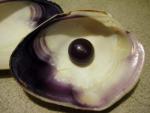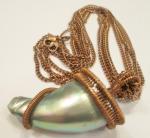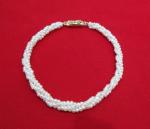|
I Will Tell You What a Diving Bell Is
Francis C. Woodworth (Francis Channing) 1812-1859, wrote a book called "Diving Bell" or "Pearls to be Sought For". Here she explains her reasoning for the title.
Since diving bells were used decades ago for searching for pearls, I thought this may be of interest to visitors to www.KariPearls.com. Why I titled my book, "The Diving Bell"
The reader, perhaps, as he turns over the first pages of this volume, is puzzled, right at the outset, with the meaning of my title, "The Diving Bell". It is plain enough to Uncle Frank, and possibly it is to you; but it may not be; so I will tell you what a diving bell is, and then, probably, you can guess the reason why I have given this name to the following pages.
 Black Pearls on Lilies by Mississippi River Francis C. Woodworth also wrote: "Jack Mason, the Old Sailor," "Stories about Animals: with Pictures to Match," and "Wreaths of Friendship A Gift for the Young."
Since diving bells were used decades ago for searching for pearls, I thought this may be of interest to visitors to www.KariPearls.com.
If you will take a common glass tumbler, and plunge it into water, with the mouth downwards, you will find that very little water will rise into the tumbler. You can satisfy yourself better about this matter, if, in the first place, you lay a cork upon the surface of the water, and then put the tumbler over it.
Did you ever try the experiment? Try it now, if you never have done so, and if you have any doubt on the subject. You might suppose, that the cork would be carried down far below the surface of the water. But it is not so. The upper side of the cork, after you have pressed the tumbler down so low that the upper end of it is even below the surface of the water--the upper side of the cork is not wet at all. "And what is the reason of this, Uncle Frank?" I will tell you. There is air in the tumbler, when you plunge it into the water. The air stays in the vessel, so that there is no room for the water. "Oh, yes, sir; I see how that is. But I see that a little water finds its way into the tumbler, every time I try the experiment. How is that?" You can press air, the same as you can press wood, or paper, or cloth, so that it will go into a smaller space than it occupied before you pressed it. Did you ever make a pop-gun? "Oh, yes, sir, a hundred times." Well, when you send the wad out of the pop-gun, you do it by pressing the air inside the tube. Now if your tumbler was a hundred or a thousand times as large, the air would prevent the water from coming in, just as it does in this instance. Suppose I had dropped a purse full of gold into a very deep river, and it had sunk to the bottom. Suppose I could not get it in any other way but by going down to the bottom after it. I could go down to that depth, and live there for some time, by means of a diving bell made large enough to hold me, precisely in the same way that a bird might go down to the bottom of a tub of water, in a tumbler, and stand there with the water hardly over his feet. There is a good deal of machinery about a diving bell, it is true. But I need not take up much time in describing it. It is necessary for the man to breathe, of course, while he is in the diving bell; and as the air it contains is soon rendered impure by breathing, fresh air must be introduced into the bell by means of a pump, or in some other way. I am not very familiar with the necessary machinery, to tell the truth. I never explored the bottom of a river in this way, and I think it will be a long time before I make such a voyage.
The diving bell has been used for a good many useful purposes--to lay the foundations of docks and the piers of bridges; to collect pearls at Ceylon, and coral at other places. I am not sure but the diving bell is getting somewhat out of use now. People have found out another way of groping along on the bottom of rivers and seas. They do it frequently, I believe, by means of a kind of armor made of India rubber. But so far as my book is concerned, it is of no consequence whether the diving bell is out of use or not. I shall use the title, at all events. If, after my account of the diving bell, you still ask why I choose to give such a name to the budget I have prepared for you, I can answer your question very easily. I think you will find something worth looking at in the budget--not pearls, or pieces of coral, or lost treasures, exactly, but still something which will please you, and something which, when you get hold of it, will be worth keeping and laying up in some snug corner of your memory box. I say "when you get hold of it"; for the valuable things I have for you do not all lie on the surface. You will have to _search_ for them a little. That is, you will have to think. When you have read one of my stories, or fables, you may find it necessary to stop, and ask yourself "What does Uncle Frank mean by all this?" In other words, you will have to use the diving bell, and see if you can't hunt up something in the story or the fable, which will be useful to you, and which will make you wiser and better. Now you see why I have called my book "The Diving Bell", don't you?
|






